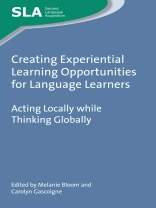While much research has been done on experiential learning opportunities in study abroad settings, there are fewer publications devoted to experiential learning in the domestic context. This volume aims to fill that gap by providing a collection of chapters highlighting research-based innovations in experiential learning in domestic settings. The book focuses on three experiential learning contexts: community engagement experiences, professional engagement experiences and other unique experiential contexts such as language camps and houses. The collection focuses on the US context but the research projects and curricular innovations described here can serve as models for educators working in other local contexts and will encourage interested practitioners to explore experiential learning opportunities in their local areas. It will also provide the reader with a better understanding of this growing field of inquiry and should appeal to graduate students and researchers who are interested in experiential language learning.
Table des matières
Contributor Bios
Melanie Bloom and Carolyn Gascoigne: Introduction
Part I Experiential Learning through Community Engagement
1. Adrian J. Wurr: Multilingual Learners and Leaders
2. Josef Hellebrandt: Community Engagement in Spanish Departments at US Colleges and Universities: Where is it?
3. Annie Abbott: Civic Engagement and Community Service Learning: Connecting Students’ Experiences to Policy and Advocacy
4. C. Cecilia Tocaimaza-Hatch and Laura C. Walls: Service-learning as an Ecological Resource: Providing Learning Opportunities for Mixed Second- and Heritage-Language Classrooms
5. Frédérique Grim: Experiential Learning for L2 Students: Steps Toward a French Service-learning Program in the Community
Part II Experiential Learning through Professional Engagement
6. Carolyn Gascoigne: Externship Opportunities for French: An Initial Response to Pedagogical Climate Change
7. Melanie Bloom: Developing Internship Programming for Second Language Students
8. Carmen King de Ramírez and Barbara A. Lafford: Mentors’ Perspectives on Professional Internships: Rewards, Challenges, and Future Directions
9. Leticia T. Mc Doniel: Internship Programs: A Platform for Locally-Based Cultural Immersion Programs
Part III Experiential Learning in other Local Contexts
10. Brigid Moira Burke: Using Expeditionary Learning Design for Secondary and College-Level World Language Curriculum and Instruction
11. Jessica S. Miller: Creative Placemaking in Cajun Louisiana: A Multidisciplinary Approach to Teaching and Learning Environmental, Cultural, and Linguistic Diversity in the United States
12. S. Marina Jones: Engaging Students through Foreign Language Campus Housing: A Case Study of a Small German Language Program
13. Jacqueline Thomas: Language Camps: By Teaching We Learn
14. Melanie Bloom: Conclusion: Future Directions in Experiential Learning
A propos de l’auteur
Carolyn Gascoigne is Dean of Arts & Humanities at Angelo State University, USA. Her research interests include second language reading and hybrid language instruction.












